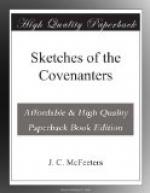Sweet home! The Covenanted home is but an annex of heaven. Home is God’s institution, endowed by Him with the wealth of infinite grace, furnished with holy ordinances, and consecrated with the blood of Christ. Do we appreciate the value, the dignity, and the advantage of a Covenanted home? Do we keep the home bright, cheerful, and inspiring, by worshiping our Covenant God, and honoring the presence of our Lord Jesus Christ?
* * * * *
Points for the class.
1. Describe a Covenanted home of the olden time.
2. What distresses fell upon these homes?
3. Can we account for these afflictive providences?
4. What is the explanation?
5. Give an incident at Lochgoin; Muirkirk; Closeburn.
6. How should a Covenanted home be appreciated?
XXIX.
The battle of Rullion green.—A.D. 1666.
A young Covenanter once stood on the battlefield of Rullion Green, pensively pondering over the battle and the heroes whose blood had watered this soil. Two centuries and more had fled since the engagement, yet the field appealed to the responsive heart with powerful eloquence. The beautiful slope, the verdant pasture, the grazing flocks, the broad valley, the distant hills, the expansive sky, the summer charms—all blended into a strange enchantment around the young man’s soul. The quiet meditation quickened the heart; the heart aroused the imagination; the imagination revived the scenes of November 28, 1666, by which this field was made memorable in the struggle of the Covenanters for civil and religious liberty. He was deeply impressed with the value of the Covenant, which was sealed with the blood of the noble warriors who sleep on this hillside. There he vowed, that if God would ever give him a home of his own, the home would be called Rullion green. God gave him a home; a beautiful residence, adorned with this name, graces the city of Airdrie to-day.
The battle of Rullion Green had its cause many days previous to the actual engagement. We will get the better view by following the chain of events.
Four years before this, to the very month, four hundred ministers had been expelled from their churches, because they would not forsake their Covenant, renounce Presbyterianism, and follow the instructions of King Charles and his Council, in the administration of God’s House.
The Covenanted people, deeply in sympathy with their ministers, refused to wait on the preaching of the curates—the ministers of the Episcopal Church sent by the authority of the king to supply the vacant pulpits.
A series of proclamations was then issued to bring the Covenanters into subjection, each proclamation being severer than the one preceding.
The people were enjoined to attend their own parish church, warned against going to the Conventicles, and threatened with fines, imprisonment, and exile for frequenting what the king termed “unwarrantable preaching.”




